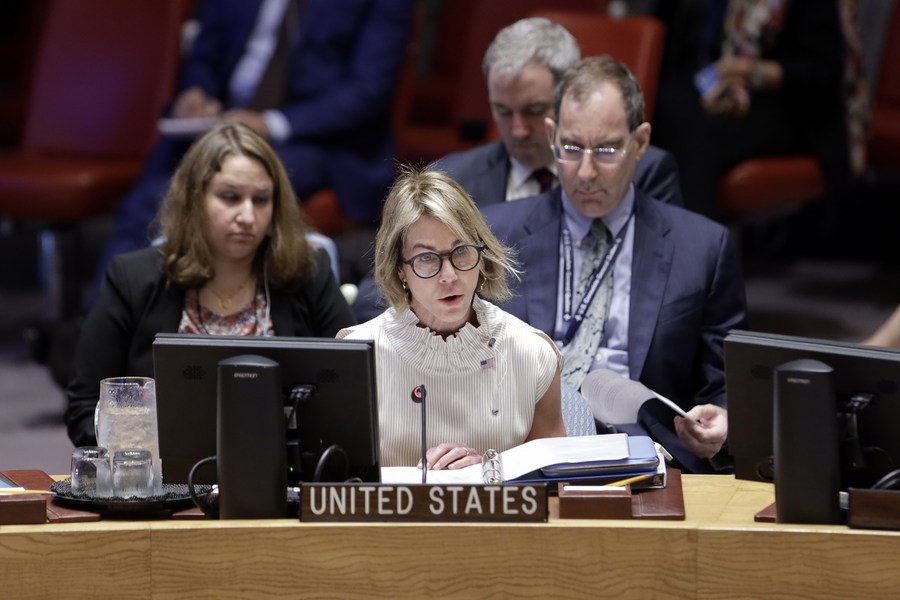By Yin Sura
U.S. Senator Marsha Blackburn visited Taiwan on August 25. She arrived after Indiana Governor Eric Holcomb, Senator Edward Markey and House Speaker Nancy Pelosi visited Taiwan this month, respectively on August 22, 14 and 2.
The U.S. lawmakers visiting Taiwan are raising alarm bells. Before Donald Trump's presidency, such high-level visits were very rare. U.S. Republican Peter Roskam took a trip to the island in 2011, and the British transport minister, Lady Kramer, visited for a trade exchange in 2015. And when China-U.S. relations were warmer, the Obama administration and U.S. legislature stayed true to the "one-China principle" line. Roskam even faced an ethics probe by the Office of Congressional Ethics over allegations that his trip was sponsored by the Taiwan authorities.
The positive attitude of the former leader of China's Taiwan region, Ma Ying-jeou was also a factor as he endorsed the "1992 Consensus" and supported good communications with Chinese mainland. This benefited both sides and helped cross-strait relations to progress on the right track.
But Washington's policy had shifted after Trump entered the White House. He normalized U.S. officials having official contacts with Taiwan authorities. Additionally, Tsai Ing-wen started to step away from the "1992 Consensus," which set up salami-slicing tactics to undermine the status quo that exists between the Chinese mainland and Taiwan.
The Taiwan Travel Act was also signed into law by President Trump on March 16, 2018. High-level U.S. officials could visit Taiwan and vice-versa, enabling an unprecedented virtual meeting between Tsai and the U.S. ambassador to the United Nations, Kelly Craft, on January 14, 2021.
Ever since, the U.S. Congress has ramped up the visits along with several legislative bodies from other Western countries. The subsequent enactment of the Taiwan Travel Act has spurred more visits from U.S. lawmakers as well as their counterparts from Japan, Slovakia, Sweden, Lithuania, France and European Union.

Kelly Craft, U.S. permanent representative to the United Nations, addresses a Security Council meeting at the UN headquarters in New York, September 16, 2019. [Photo/Xinhua]
And other lawmaker visits to territories of states with limited or no recognition remain one-off occurrences that often go unnoticed.
The U.S. Congressional delegation visited Somaliland for the first time in over a decade on December 13, 2021. Nonetheless, these visits bear a heavy political significance triggering a huge backlash from the offended states. This occurred when a European Parliament delegation cancelled a trip to the Palestinian territories in May, after its chairperson Manu Pineda was denied entry to Israel, most likely because of disputed territorial claims over parts of Jerusalem.
Furthermore, even when parliamentary groups visit UN-member states, which are considered controversial for some Western countries; it can spark a furor within their political classes. That's what happened when French lawmakers met Syria's President Assad in 2015, prompting the then French President, Francois Hollande, to condemn it. Similarly, when a group of French lawmakers visited the disputed region of Crimea in 2015, the French Foreign Ministry condemned the trip saying it was "a violation of international law."
Thus, we could surmise that the absence of condemnation from Western governments every time lawmakers visit Taiwan means that they oppose a commitment to the "one-China principle" – which is enshrined in the Three Joint Communiques – and violation of international law.
Despite reassurances from Washington that nothing has changed about its one-China policy, in reality they are testing the boundaries of the status quo. The high frequency of those visits coupled with extensive media coverage and a rise in arms sales from the U.S. to Taiwan authorities; all betray the spirit of the Three Joint Communiques.
The Biden Administration doesn't seek to improve cross-strait relations, nor hopes to facilitate the peaceful unification of the two sides. Taiwan secessionist forces and the U.S. will continue to push the envelope as far as they can, and in their minds, those visits are a form of official contacts that give Taiwan more international space and legitimacy.
Yin Sura has a Master's degree in Statistics and Financial Engineering from PSL University and writes about geopolitical issues.

 中文
中文



